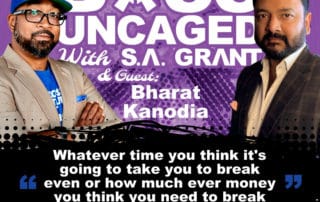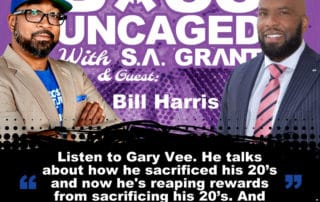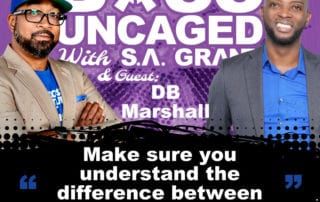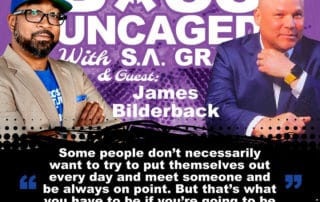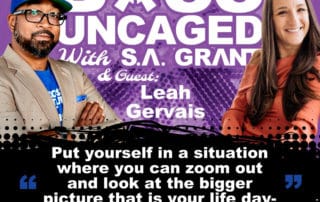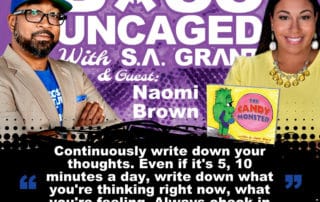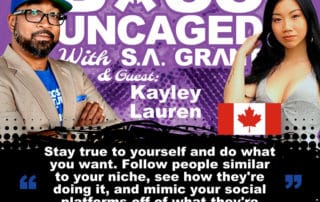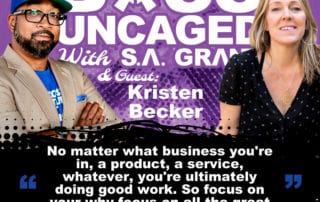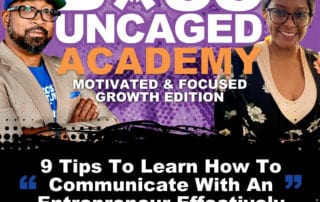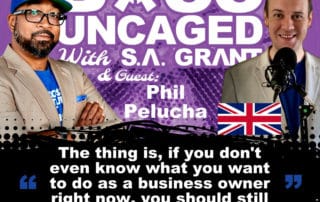Founder & Chief Appraiser Of What’s It Worth: Bharat Kanodia AKA The Valuation Boss – S2E48 (#76)
Boss Uncaged Podcast Overview
- Why he decided to start his YouTube channel
- His experience on valuing the Brooklyn Bridge
- The importance of routine in his life
- And So Much More!!!
Boss Uncaged Podcast Transcript
S2E49 Bharat Kanodia.m4a – powered by Happy Scribe
Alright. Everything is good. Your audio is good. 3 , 2, 1. Welcome. Welcome back to Boss Uncaged podcast. On Today’s show. It’s going to be an interesting particular episode. Our guest today is Bharat, and he has a YouTube channel called “what it’s worth?” And I want you to really think about the definition of that. It’s not necessarily like the value of a car or the value of an individual person. It’s like, what does your business really worth? So I’m not going to take away too much of his Thunder. I’m gonna let him kind of do more of the introduction to kind of tell you more about that YouTube channel. So, Right? Go ahead, man. Floor is yours.
Shannol Thank you for having me, man. I appreciate it. Yeah. I mean, I’m an evaluation expert, and I’ve been fortunate or unfortunate to have valued some of the most interesting or unique assets in the world. And I created my YouTube channel because I want to lift the veil, if you will, and explain to people that they can just personally value anything and everything by themselves, if they just know what to do and what to look for. My channel is, I guess, allergic to geek talk. People in my world love geek talk, and I can go toe to toe with anybody on geek talk, but I feel that does not help people. So my videos are very simple, concise and hopefully entertaining.
I mean, it’s funny. Like before I usually do podcast, I try to do a little bit of an evaluation of who I’m going to interview and just to be kind of transparent with my listeners, I’m coming into that space of podcasting to where people are falling into my lap. Like, prime example. You reached out to me. This is the first time where we’re meeting, but I think this is going to be a very interesting conversation. And so I’m looking at one of his videos, and he’s talking about economic benefits and the V minus B over C. And I’m sure he could dive into the talk shortly. But to find out, you did an evaluation on the Brooklyn Bridge is where I’m originally from. And you did an evaluation on the Atlanta airport where I currently live. So let’s just talk about that journey a little bit, right. Like, how did you even get into the opportunity to doing an evaluation on two epic pieces of land?
You know, it was very serendipitous. I was a young kid working for a company called American Appraisal. It was the largest and the oldest valuation firm in the world. In fact, they founded the evaluation business in America in 1895, and my boss one day comes up to me and says, Brat, we got this contract to value the Brooklyn Bridge. And I was like, okay, fantastic. Who’s doing it? He’s like, you are. I’m like, okay, I’m like, you know, I’ve never appraised a bridge in my life, and you want me to start with the Brooklyn Bridge of all things. And he’s like, Yep, that’s what we’re going to do. And then he also says, oh, by the way, I’m going to give you three guys when you get a train on the job like, okay, alright. So what are you going to do? You sort of just keep working and figure it out along the way. So I did. And it wasn’t as I look through the proposal, it just wasn’t the Brooklyn Bridge. And I can talk to you about this because you are from New York. So you know all the details. So it included the George Washington Bridge, the Tappan Zee Bridge, the Triborough Bridge, the Battery Tunnel, the Lincoln Tunnel, Grand Central Station, 42nd Street, Time Square Station. Basically all the infrastructure owned by the New York City MTA. So you know men in black. When you are walking through that exhaust Chamber with the fans rolling in, the guy sitting here, I was just bored out of his mind. Now the Battery Tunnel entrance. I have appraised a battery tunnel entrance. So I’ve been fortunate, as I said, or are unfortunate to be thrown in deep end and to have value such assets.
So I mean, at first when I heard the Brooklyn version, I’m sitting here you know 50% creative, 50% analytical, and I’m sitting like, there’s no toll plazas on the Brooklyn Bridge. So like what’s that is it like more of a historical value. Is it more like a landmark value? Like, how the hell do you get an evaluation if there’s no costs associated or no revenue stream associated to it? I mean, you just alluded to it. Obviously, the tunnels, there’s lots of value with the reoccurring revenue stream. So just go into that a little bit more like what does the evaluation process look like? What are you seeing has value versus what doesn’t have value.
That’s a great question. So first question I always ask as evaluation expert is, what do you need evaluation for? Nobody wakes up one morning and says, hey, Chanel, I’m going to get my house value today, or I’m going to have my business value today. There’s a need or there’s a purpose for it. So the purpose for why I was valuing all the assets for the MTA was insurance. So imagine you are some big shot partner at Lloyds of London in London, sitting there smoking a cigar and watching the Twin Towers come down and you’re going, Holy shit. I might actually have to pay out these premiums someday because they were more than happy to collect these premiums. But when it came down to assessing the risk and understanding it, they were scared because they were like, wait a second. These infrastructure assets are underwritten by us. So they had hired my firm to ensure that the appraisals that they had on the books is the most up to date. So that’s why I was the one put in charge to go around the country and to value all these large infrastructure assets which were underwritten by Lloyds of London, many of them in New York City. So that was really the purpose. So in this case, it was insurance. So, yeah, some of the assets had told Plazas, like Verizon has told Plaza, Brooklyn does not. Right. So when you’re looking at valuation for insurance purposes, I need to consider the income from the asset, but at the same time, I don’t have to consider it because it’s not relevant. If the bridge were to come down today, they’re going to have to rebuild it. And that really they’re looking for replacement cost of the bridge. That a similar bridge. Similar functionality, similar capacity. What might it cost to the under a writer to rebuild that bridge?
That makes perfect sense. We’re new to each other. So I hold insurance license as well in multiple States. So I’m more so on the life insurance side. So I understand the value add that you’re describing and a lot of people always kind of explain to them understanding that with car insurance, you’re paying a premium. If that car was ever to get into accident, they’ll replace that car life insurance. You’re not going to replace a life. What you’re going to replace is the income. So what you’re talking about is kind of like that Gray area with a property. We’re not going to essentially replace the income of the bridge. We’re going to replace the cost of what it’s going to cost us to rebuild the bridge. Is that correct?
Precisely and when I say rebuild, that does not necessarily mean they need to put in the exact same Brooklyn Bridge. Again, it could be a different design, but comparable functionality, comparable capacity. Right. I mean, you know has to go from the same from, say, Manhattan to Queens. If it goes right? Manhattan to what’s the site?
You talking about the Brooklyn Bridge. It’s Manhattan. Brooklyn.
Yeah. Manhattan to Brooklyn. Sorry. Yes. So it needs to sub the similar.. exact same purpose. It can’t be different. You can’t be putting in a Basque bridge there. It has to have similar functionality.
I mean, that’s definitely interesting, because, I mean, obviously, the Brooklyn Bridge to your point, it’s a hell of a landmark. Right. When you’re talking about bridges, I mean, you can put a picture up of San Francisco, you know that bridge, right. Brooklyn Bridge. You can see it in any picture and identify does that whole value as well? Is that the tangible value to that bridge?
Unfortunately, no. And there are two reasons for this. If the bridge were to come down and they were to replace it, they can’t use the poll design, because, frankly, nobody’s going to build it using the old design. You can’t find construction workers or designers to build it like that. And Secondly, I am not smart or qualified enough to value the historic value of the Brooklyn Bridge, right? Yeah. It’s a beautiful bridge. If I were to start looking at valuation from a historic perspective. Then it becomes a piece of art. Right? Then it’s almost like trying to appraise Picasso. I mean, I’m an appraiser, but I don’t know shit about Picasso or appraising art, right? So that is really out of my school of understanding.
Okay. So let’s just time travel back, right? I mean, you’re in a hell of a niche. It’s not like a niche that you just wake up on a random Tuesday at age seven and say, hey, I want to value landmark properties. Like, how did you even get on this journey to become what you are currently?
It was serendipitous, if you will. I graduated from College with an engineering degree and didn’t want anything to do with engineering. But who’s going to give a 21 year old kid who has an engineering degree a job in finance, which is what I really wanted. But I found this one company who was looking for engineers, but to work on finance projects. So somebody who can understand bridges, even though I’m not a civil engineer, I’m a mechanical engineer, but I understand science. I understand trusses. I understand loads. So they hired me, and then they trained me to use my engineering background, but apply it to evaluation. And that was just serendipitous and turned out I was half good at it. So I stuck with it.
I think that’s really interesting. I mean, the formula is very transparent, and I always kind of preach this as far as like being a podcast or being a media person and finding your niche. Right. So I’m a podcaster that also deals with publication. So if I was to cross reference my niches, it’ll be books and people that are creating books and authors. And it’s also people that are creating podcasts and creating content. That’s my cross niche. So you did the same thing. You have an engineering background and you want to get into finance. So you found a tunnel to figure out how do I I put both these digits together. So you became more finance. But you specialize in engineering, essentially, very much.
So. Say, for example, if somebody wants to become a news anchor in Tampa, right, you catch go and become a news anchor in Tampa. You either first go to Tampa and find a job in broadcasting or some kind of media and then move your way up to news anchor, or you become a news anchor or find your way up to broadcasting in Charleston, South Carolina, and then find a position in Tampa. So there’s always got to be an intermediary step steps to get to where you want to be. So, for example, I created my YouTube channel because I really want to have a show on Netflix. Nice for educating people about valuations, about businesses, about houses, about cars, about investments. So YouTube, for me, is an intermediary step because nobody knows who the hell I am. And nobody, frankly, would give a shit. I mean, there’s so many schmucks like me who want to be on Netflix, but what are they doing about it?
Exactly.
So I decided that. All right. Well, I want to be on Netflix. Well, people need to see me and, like, my work and see what I can create. So I created the YouTube channel. So if you see my YouTube channel, I’m not a regular YouTuber. I’m not going like this going like, hey, guys, how are you doing? I don’t do that yet. If you see my episodes, the production value is pretty high. It’s all scripted at this time, but the production value is high, and my director works very hard to make sure that the field that we’re giving, even though my episodes are short, he ensures that the field that we’re giving is almost like this is broadcast or streaming show. It’s not a YouTube show, and people respond to that.
Yeah. I mean, to your credit, I’ve went through your YouTube channel and looked at it, and I think one of the episodes that resonate the most with me. I think it’s one of your highlighted episodes about the grocery store. And to your point, like the visual of you coming out the car with your kid and you’re kind of depicting the story which you’re talking to the camera. So you’re kind of doing, like a narrative is definitely an influential factor for that target audience, which essentially, I would think of business owners. I can see myself walking into this environment, and I was thinking about buying a grocery store. What’s the evaluation of a grocery store and you kind of take their hands and you walk them through it while you’re walking in there with your kids. So to your point, I think definitely you’re taking action to get that perceived value to then have a pitch for Netflix. So I definitely commend you for that. I think it’s a hell of a journey, and I would like to see where it ends up.
Yeah. Thank you. No, it’s been fun. And that’s where I want to be. I want to be on Netflix or broadcast TV because I think this can really help people. People want to know what things are worth. And, you know, back in the day, people wouldn’t know. Over the last 15 to 20 years, Shannol, evaluations have become a very important part of our lives. The stocks we buy or the houses we buy or sell or the cars we buy or sell or whatever we do, the College we go to, everything has a value in a perceived value. But once you understand what valuation is and what increases value and what decreases value, it can really help your life. No different than understanding how to deal with credit card debt or dealing with a bank or dealing with a mortgage, you should know how to value things.
That’s very true. Very true. So on this journey right now, you’re doing evaluation. You’re not just doing a house appraisal. You’re doing multi billion dollars evaluations. Like, what’s the worst experience you’ve encountered on this journey of evaluating such high ticket items?
It is scary. Many of times nobody trains you for doing these kinds of evaluations. There’s no go to guru. You are the guru. You have to declare yourself as the guru because you are committing to learning everything that needs to be learned to do the evaluation correctly. So that is a scary part. And it is also probably the most exciting part that there ain’t no book. Nobody has a YouTube channel saying that how to appraise a Brooklyn Bridge. Nobody’s written the book on this. There’s no cliff notes, whatever you uncover, whatever you discover and learn and you apply. That the go to standard. So it is scary and exciting. Nobody’s done this.
Got it. So in your business structure, right? Obviously, you have a financing, a completely different understanding and more in depth understanding of most people. How is your business structured? Are you, like, a C Corp. S Corp. LLC?
We’re an LLC, and we used to be a C Corp and we switched to an LLC just because my CPA told me to. So I said, Fine, I don’t care. It’s just schematics as far as I’m concerned. So we’re an LLC.
So we always hear about the 20 years, right? That’s perceived to be like an overnight success. Somebody pops up like, prime example. When you get your Netflix TV show, they’re going to be like, oh, my God. Who’s this guy? He came out of nowhere. But in reality, this journey has took a period of time. How long have you been on your journey to your current success?
My YouTube channel launched in August, so technically, my sort of media journey has been since August, so it’s been less than six months. But it took me time and a lot of learning a lot of mistakes to decide to create a YouTube channel. You’re a marketing person, so you’ll appreciate it. I had spent about $150,000 over the last three years in marketing in SEO and conference sponsorships and gifts and PR. I mean, you name it. I did it. I threw money at everything. Results marginal. Every time I hire an SEO team or a PR person after they would take my retainer for the first three months. And after the first three months, when I expect results, they would come and say, oh, you need to give us content. And I was like, Well, you should have told me that three months ago, but Nevertheless, I’ll start giving you content and the more content I gave them, the more content they wanted. And then they said, oh, you got to give me this type of content, that type of content. And this is what you’re not doing, right? So, like, wait a second timeout timeout. I hired different people and they all had the same issues at some point I felt like I was being taken advantage of. So I figured out that marketing or all this SEO, PR, all this bullshit, what really is what really works is content and original content and video content is the King of Kings. So I just invested in video content after losing sleep for three years over stupid things and stupid investments I made. And ever since I’ve done this investment, I’ve been happier. I have been more connected to people now. When people approach me, they have seen me. They have seen my videos, right? So they have seen me walk and talk and describe things and be authentic on TV because I do my own writing. So it comes off as authentic. So when they come to me, they already feel like they know me. I mean, what else could you ask for?
It’s true. Very true. So with that, right. And I think that’s a good segue to my next question. If you can go back and do everything all over again, what would you do differently?
I would have started my YouTube channel, like, ten years ago, you know, just let people see me and talk to me and just keep educating people in sort of writing blogs or spending money on SEO or hiring PR people. I would have just created a YouTube channel. Nobody in my business has a YouTube channel. Nobody has put this kind of effort into marketing, into education. People are writing blogs. But let’s face it, how many people really read anymore? If I want to learn anything, I just go to YouTube and type whatever I want to learn about, and it pops up. The only thing that doesn’t pop up is if I want to learn anything about evaluation. So if I want to learn something about, hey, what is a podcast worth? No, there’s no video. If I want to learn something about what is a hotel worth, there’s no video. If I want to learn something about what’s an e commerce company worth, there’s no video except for mine. Okay.
So have you dealt with any like, I guess, franchise in the sense. I mean, you’re talking about podcasting. And that made me think about, like, a conversation with somebody that kind of offered to essentially franchise the Boss Uncaged podcast. So diving into that, like, where would you start in evaluating a podcast in that market?
See, at the end of the day, it really depends on the the quality of the content and the recurring audience. If you have set audience that are your fans and they listen to you day in, day out. That’s what’s valuable. If you have one show that all of a sudden you have a million downloads and the next show, you have a thousand downloads again, that’s not valuable. So, Seth Rogan, that’s what Joe Rogan, Joe Rogan. He just sold his podcast to Spotify for 100 million because he’s got avid listeners, people who listen to him every day. That’s really the quality. That’s really what attracts people. So my whole goal is to build an audience using YouTube channel so that people can see me and see my work and see my creativity and using that as a launching pad to get into broadcast or streaming media.
So it seems like you have a very big handle on general business, and you have, like, a hustle mentality. Is that something that was ingrained in you as a child, that you grew up in an entrepreneurial family?
Oh, very much so. Very much so. You know, my father was an entrepreneur. He was a businessman. My grandfather, everybody in my family is an entrepreneur. And they’ve been like this for a long time. Except my brother and I, we are not. Well, I am. But back in the day, I wasn’t. I started my career as a regular nine to five, and my brother did, too. And that was totally cool because you got to make your mistakes somewhere. First learn from good bosses and then go out on your own people who just go out in entrepreneurship right off the bat. I don’t know if that’s the smartest thing to do.
Okay, so on this journey of your current entrepreneurial endeavors, right? Life happens. So how do you juggle your current hustle and your work life with your family life?
carefully, You know, I’ve had to force myself to become a person of a routine because unless you have a routine, you can’t do anything. I have to write. I have to respond to clients. I have to lead my team. I have to talk to my editing team. I have to talk to my producer and my director. I have to deal with my clients. I have to attend client meetings. I have to attend networking events, have to spend time with my kids. So everything takes time. I have time slots every day, hour by hour. Okay. This is my time slot for this is my time for that. Back in the day, I would be sitting on my email and wasting my all day. And it’d be like, wait a second. I’m working, but I don’t really do anything today. And then this happens with most of us. And it still happens with me sometimes. But now what I’ve done is I stick with these time slots. I don’t spend too much time on LinkedIn or Facebook or just responding to emails. Nowadays, I respond to emails in the morning. Once I’m there because you have emails from overnight, so I respond to them and then I switch off my email. I’ll respond to them in the afternoon and in the afternoon I have, say, 50 emails. I just go from bottom up, I respond to all of them, and then I’m done. And if somebody doesn’t like it, sometimes nowadays people get pissed off when you don’t respond to their email within an hour or 2 hours. I’m like, Well, I guess we’re not going to be doing business together, are we?
Yeah, definitely. I mean, I think I just finished reading Deep Work, and they were talking about that particular element about if you’re receiving an email for somebody, they should make that email congruent and easy enough for you to respond. Back example of that would be, hey, do you have time for a meeting today? Well, I don’t know. Why don’t you give me some time options so I could set of me doing the work looking for the time slot, say, hey, do you have an availability between three and 04:00? That slim it down for me to say yes or no, and I can easily respond versus me having to stop, leave my email, look at my calendar and then try to figure out times for you. So to your point, it’s kind of getting into the deep work mentality. You have to kind of turn things off so you can get to the work and then turn them on afterwards. So diving into that a little bit more, right? You’re saying you have routines? What does your morning routine look like?
Most days my call start at 04:30 a.m. So I live in the West Coast West Coast. People usually start early because East Coast people are already 3 hours ahead. I wake up at 04:00, I shower, shave and I am on my phone or on Zoom by 4:30. I have back to back calls from 4:30 till 09:00. I take a break at 09:00 and from nine to 11:30 is my creative time. So I sit down and I write or think about topics for new shows. And then I have a call with my production team around 11:30 and then I have from 12 to 3 is my time for meetings. And the reason I set up 12 to 3 time for meetings is because I always used to feel so sleepy and lethargic after lunch I said, you know what? Fuck it. I’m just going to set that time for meetings, so I got nowhere to hide. So. I just sort of bullied myself into doing meetings from twelve to three. So even if I’m sleepy, I got to pretend to be active to podcasting. I do during my creative time. So this is my creative time. So I get to spend that time with you right now.
I definitely appreciate that. So in that journey, right? I always ask this question because part of your creative time and on your journey, you’ve had opportunities to learn multiple different things. And I would assume because you’re well spoken. I would think that you’ve read many books on that journey and you probably have many books that you’re probably reading currently right now. And because of that, I’ve created a book club for listeners of this podcast. So my question is, what books did you read to help you get to where you are? What books are you currently reading? And what books do you want to recommend.
So to be very honest, I am not an avid reader, and it sucks to be saying this because it’s not sexy, right? Everybody says, oh, I read so many books, and the successful people read books. I read books like the last book I read was this one. And I thought this was excruciatingly boring. The New Great Depression by Jim Ricard. Good book. But frankly, I think the authors make it very, very boring nowadays. They don’t know how to write. They good at their subject, but they’re terrible writers. They really need to work on their writing craft. So if I frankly want to learn anything, Shannol, I go to YouTube. I really do. I would rather watch something on YouTube than read about it because I feel YouTube is visual. I always learn more when it’s visual, and that’s why I created a channel. I had an option to write a book. I could have written a book. I can write a book right now. I already have the material. All I got to do is compile it, you know, a week or two work. But I’m not going to do that because I think it’s boring. Who the hell wants to read a book? It’s boring. I’d rather just watch a YouTube channel and I encourage everybody to do the same thing. But coming back to your question, the books that have inspired me have been actually this one . I am a Cook. This is one of my favorite books, Sacred Geometry and Deciphering the Code by Stephen Skinner. And this one they talk about the sun and the moon and the stars and the Earth and how animals living things in geometry is all connected and how it is all sort of God’s secret plan or Mother Nature’s secret plan. Fabulous book, if you ever get a chance.
Yeah, definitely. Take a look at that. I think it’s definitely just going back to what you said. And to your point. For the longest, I hated reading books. And then I got to the point to where I started listening to more audio books and watching videos. It’s kind of like that point now to where how could make the content, make the content a little more richer. And if I want the multitask or if I just want to kind of lay back and listen to something. So I definitely think that you’re in the right direction, in the right space. As far as how could we make that content a little bit richer?
For example, you’re podcasting. You think the work, your body of work is anything less than a book?
Hell, no, no, no. But I dibble in both. Right. So for me, I’ve published seven books and I also have a podcast. And I’m working on the integration between because some people. But I’ve just learned and being in the marketing, you can’t appease everyone what you could segment ate. So I have some people that are avid readers that want a physical book. They want to crack the spine, smell the glue. Some people they don’t have time for that. They want to listen to audio, and some people just want to. They are traveling or whatever. They want to visually see what you look like here. You see your body action, see your language, see the way you say particular things, much like your videos.
One thing I would have to say that writing a book gives you instant credibility. So many people I know who are speakers or who are authors or who are business coaches. They just end up writing a book because they say people respect you more. People think that you know what the hell you’re talking about. If you’ve written a book, even though it might have sold like four copies on Amazon, now you still get the a published author title, which frankly, I couldn’t care for. I don’t know. I’m saying that right now, but maybe six months from now you’ll be seeing me promoting a book but right now that’s not what i am looking to do.
Alright, that may come with Netflix contract.
they might make it prerequisite that. Hey, just write a damn book before you get on our show. Fine. I already have the material.
Very interesting. So where do you see yourself in 20 years from now?
20 years from now, I want to be running a school after my Netflix deal. I want to be running a school because I think I’m an educator at heart and I think the education system has left a lot to be desired. I would like to change that. And instead of just bitching about it, I’m going to do something about it. I.
Can definitely see you is by watching your YouTube videos. You have a certain style of elegance to the way your delivering that content. So I think that’s what’s going to take you a lot farther than I think that you could even imagine, right? I mean, you’re giving content which are giving such a value ad and you’re holding the hands of your listeners step by step by step, which is a great foundation for teaching.
Thank you. Thank you.
Yeah, definitely. So what tools do you use in your industry that you would not be able to do without software, for example?
Oh, I’ve tried to use minimum software. Personally, my team uses different software, but I’m more of a people person, so I sort of engage with my team one on one. The software, so to speak, that works for me is my routine and consistency. So I speak to my team every day. We have daily scrum calls. We see exactly what’s happening because people can make mistake once they might miss something once or twice, or they might not get it once or twice. But if you’re talking to them every day and you’re being polite and you’re being kind and you’re generous, they see that they recognize that and they respond to it. I’ve made this mistake in the past where I will talk to my team once a week, and I think that’s bullshit. I think you got to talk to them every day. Now, you don’t have to grill them every day. It doesn’t have to be a two hour long meeting where everybody’s going, like, Holy Jesus Christ. I got to spend 2 hours with this guy again. No, it can be anywhere from ten minutes, 15 minutes to a half hour depending on whatever needs to be talked about. But you got to touch on it every day, every day. That’s my software.
Interesting. Definitely. Interesting. So let’s say I’m 36 years old. I’m working for some equity firm, and I’m deciding I want to kind of step out on my own. I’m looking for something. What words of wisdom would you give me? It influenced me to continue on my entrepreneurial journey.
Whatever time you think it’s going to take you to break even or how much ever money you think you need to break even, estimate the maximum you can, right. So if you think it’s going to take you six months to break even, are you really sure six months is the maximum time you can think of? Yeah, it probably is going to be nine to ten months. If you say it’s nine to ten months, it’s not going to be nine to ten months. Just double that. It’s going to take you 20, 22 months. So whatever is the highest number you can come up with to estimate your time to break even. Double it because it always does. I have thought it’s going to take me a year to break even. My company broke even on the month. Usually companies. I knew this going in that usually it takes 24 to 30 months for companies to break even. But I was young and stupid and ambitious. I said, oh, I can make it happen in twelve months. No way took me 24 months.
Okay, okay. So how can people find you online? Obviously. I think right now your funnel starts with your YouTube channel. So what’s your YouTube channel? Your website, your Facebook account, so forth and so forth.
Best way to reach to me is through my YouTube channel. My YouTube channel has my email. And if you reach out to me, if you have a question, I’d be happy to answer it for you. I enjoy educating people about valuations.
and the YouTube channel is What’s it Worth?
What’s it worth? Just so just go to YouTube put what’s it worth, bharat it’ll pop up. There aren’t too any Bharat on YouTube.
This is funny that you brought up that name, right? And it’s going back to the episode that I had with Damon. And before the show he was talking about, like, how our names kind of throw people off. So like Damon, people ever thought of his name, and I was like, Shannol to Shannol. And I get Shantel Shinobi and everything else. So a couple of times on this show, you said my name, like, shannal. And I was just kind of like, I’m smiling entirely. But I want you to get that thought across. But I was just like, what is a good opportunity to tell you that it’s Shannol.
Sorry!
No, no, it’s funny because it’s one of the those things, like, when you hear someone’s name, it takes a while for you to kind of understand the syllables of a name like your name. I literally was like, how do I say your name and trying to figure out how do you say your name? So this is a good example of when you meet someone for the first time, you kind of have to kind of go through these things to kind of figure out. So moving forward, I think both of us going to understand each other’s name, right? I know how to say your name, you know, to say my name and then moving forward, we have an opportunity to if I decide to send somebody to your direction, I’m not going to mess up your name in that instance. Right.
You got my name right off the bat.
Yeah, but it’s part of podcasting, right? It’s part of interviewing people because a lot of times people will be like, wonder why I don’t say someone’s last name? Because I’ve learned that a lot of times last names are harder than first name. So I always use everyone by first name. Just because even though, after they told me their last name, I still probably would Butcher the last name. It Is one of those tricks of the trade. So, I mean, throw it to the bonus round, right. If you could spend 24 hours with anyone dead or alive, who would it be? And why?
No question in my mind has to be Teddy Roosevelt. He was one of the greatest presidents we ever had. He gave us the national parks. He gave us a Panama Canal. He ended the war between Russia and Japan. We owe him a lot of debt. And he was a man’s man. He was a Hunter. He was a rancher. I would like to spend just 24 hours with him just listening to stories.
I think that’s a testament to your legacy, right? You’re in engineering, so you could see the value. And most people may see Teddy and may see them for totally different things. But the fact that you went into the infrastructure that he’s developed from the architectural standpoint is a hell of an insightful thing that I think the average person would have just blown pass them. They wouldn’t realize it. So definitely. I think that’s an insightful answer. I definitely appreciate that answer.
Thank you.
Going into my last question. If you could be a superhero, who would you be in? Why?
You know, I’ve recently seen this movie Antman. You’ve seen it?
Yeah. Yeah, definitely.
Yeah. It’s actually pretty cool production. When I was a kid, I used to dream about having you know i used to play with those hot wheel cars. I would always dream about being able to get inside that car, but still go 80 miles an hour and zip through everywhere and nobody be able to see you. And for me, Antman was; Holy crap that’s the guy want to be. So yeah, and man would be cool, even though it’s a terrible name. But I like the premise of it.
And I think you’re also like, I wouldn’t say tech guy, but you understand the science of things. You probably like the science part of it as well, too. It’s definitely good. I mean, obviously, at the end of the podcast, I always give the opportunity whoever I’m interviewing, opportunity to interview me. I mean, during this journey of this conversation, and this is the first time we’re meeting. You may or may not have questions that have come up. So the microphone is yours. Feel free to ask me any questions you may have.
You know, when I reached to you, I was most intrigued by the name of your podcast, Boss Uncaged, tell me the story behind it.
So Boston Uncaged is one of things like my other company that i own is called Cerebral 360, and there’s a whole story behind that in cerebral intellect, mind, blah, blah, blah, blah. But nobody knows how to spell that. Right. Kind of going back to the name, trying to spell cerebral. It’s kind of like phonetically becomes difficult. And I was like, Who’s my real audience? Who am I really talking to? When I’m talking to the easiest four little word, I can think about bosses, right? Boss symbolizes entrepreneurs, startups, small business owners. All of those multiple levels of letters are all condensed into four letters. Boss. That’s the first part. The second part is being Uncaged. Part of my audience is people that are wanting to leave corporate America, people that are wanting to make the leap. So they are behind bars currently, right now. So in becoming a boss, they have to become uncaged, they have to break out the everyday nine to five situation. Take a leap of faith, so that’s the combination of the two being a boss and being uncaged. So that’s why I named it. Both of these words are very simple words, and they have a lot of meaning, and they could define a lot of content. Bind.
It’s pretty bad ass. I like it. And I’m most surprised the domain name was available because I don’t think that’s a domain name that could be so easily available unless you bought it a long time ago.
Within two to three years.
Yeah, I’m surprised you found it, but no, it’s a great name. It’s cool. It’s different yet at the same time, it points in the right direction, same way with my name. What’s it worth? Like. Okay, what? What’s it worth? Okay, once people start getting is like, oh, yeah. Okay, that makes sense.
It’s self defined. I mean, I think your brand is definitely a self defined name because, I mean, your episode start off right away. It’s kind of like you want to know the evaluation of Airport. Here it is. You want to know the evaluation of supermarket and you’re going right into the definition of your title right into your topic.
I am no bullshit kind of person, and nobody wants to hear me up on the phone or listen on YouTube. I’m cool and all, but I’m no Dolly Parton, and I know that. So I just get right to it.
Yeah, well, I mean, if you have any other questions, this will be the time. If not, then I definitely appreciate your time coming on the show today.
It was great talking to you, shannol. I really appreciate you having me.
Yeah, I definitely appreciate. I think you given our listeners some insight, and it’s always opportunity for me to understand that there’s a million different ways to make money, and it’s a different opportunity. Always right around the corner. And until someone kind of hear what you do, they may not realize that that’s an opportunity for them to become uncaged boss themselves into your space.
Pretty much,
S.A Grant, over and out.

